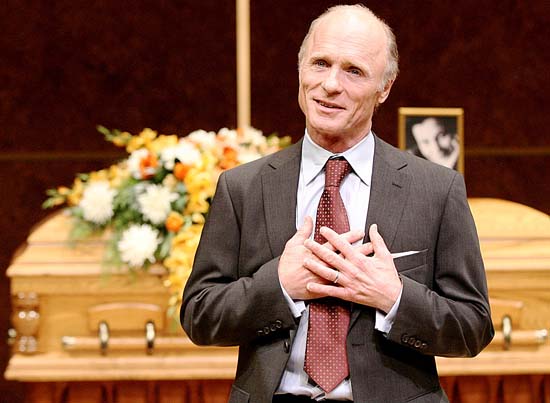Before the play “Wrecks,” the audience is seated to the music of Nat King Cole. With his soft-as-velvet tones, Cole sings about that special lady, the mere thought of whom makes him forget about everything else. Thus the mood is set for the next 75 minutes, where love, in all of its overwhelming intensity, is explored.
Playwright and film director Neil LaBute (“The Shape of Things”) first presented “Wrecks” in Ireland in 2005 with Golden Globe-winner Ed Harris in the title role. “Wrecks” is now showing at Geffen Playhouse until March 7.
Harris once again returns to play Edward Carr at the Geffen. Edward is a successful businessman and recent widower. The play takes place at the funeral of his wife, Mary Josephine. What occurs is a 75-minute monologue, detailing the life that Edward had with her, his Jo Jo.
Alongside the story about Edward and Jo Jo, all told in a nonlinear fashion, there are interspersed details about Edward’s childhood, his likes (cigarettes), dislikes (modern cars), and the superficial nature of funerals.
The beginning finds Edward wondering how to properly eulogize his wife, finding himself dissolving into empty words in the name of being respectable. As such, the play can be taken as a product of Edward’s subconscious and what he truly wants to say, albeit in a crude manner sometimes.
But it feels more real than the superficialities of “indeed” and “she was a great lady” and endears him instantly with the audience. You do not mind that he is smoking ““ after all, as he wryly reminds you, “I’m a widower now.”
Harris, known predominately in Hollywood as an accomplished dramatic actor, lends the necessary gravitas and everyman quality needed in the role. He originated the role and performed the show in New York. As such, he has had enough time to sufficiently inhabit Edward, to truly know the character in and out.
Consequently, he makes Edward and his frustration and grief relatable. When Edward weeps, your heart breaks along with him, and when he bounds onto the seats in a display of energy, you are surprised that such a force could come from such a solemn figure.
This is a testament to how much Harris disappears into the role and how much he excels at it. It is not easy to hold an audience’s attention, by yourself, for 75 minutes. Yet Harris makes the task look effortless.
Any aspiring theatrical performers need to see this play, if only to learn how to keep an audience entranced, even when you are rambling.
Yet not all of the praise can go to Harris. LaBute ingeniously crafted a tale that seems so simple and positive on the surface that it is easy to overlook some of the play’s darker aspects.
To go with the simple prose, the staging is also minimal. The only props are some plush seats, potted plants and a coffin. Yet it is effective as it allows the central focus of the play to be on Harris, which is necessary when dealing with extended monologue.
There were some parts that dragged, as it is wont to do in a one-man show. Sometimes Edward’s digressions devolve into mindless ramblings that seem like they were placed there to increase the running time.
Yet among such wayward thoughts, he always turns back to his Jo Jo and of their 30-year love affair. And at the end, when everything about their marriage has been laid into the open, the audience is also left feeling raw and unsettled at how much information they have just been made privy to.
It is almost too private and as such, a bit unsettling. But I will say no more. It is better to go into “Wrecks” with little to no expectations.
Surprise is good in this case because you will not want to know beforehand how far LaBute takes the notion of love. Suffice to say, he reminds you just how nuanced, complicated and overwhelming it is.
The play closes with Cole singing “Let’s Fall in Love.” And after seeing “Wrecks,” you might wonder if you actually want to.
